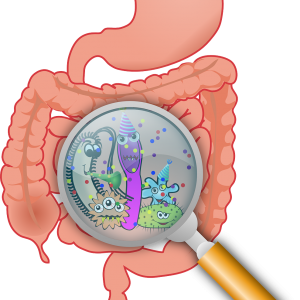Gut Health: What's In It?

What are pre-biotics and pro-biotics?
Your digestive system (mouth, esophagus, stomach, small intestine, and large intestine) is a very complex and ever-evolving system. Consequently, the interaction between hormones, enzymes, and bacteria is quite the microscopic symphony. As a result, it requires a high degree of coordination and cooperation.
"You want your gut flora to be strong..."
Naturally occurring bacteria (“gut flora” or “good germs”) are sometimes called PRO biotics. In contrast, indigestible fibers that those bacteria digest – but you cannot – are called PRE biotics. For that reason, PRE biotics (fiber) are called the food for PRO biotics (bacteria). You want your gut flora to be strong so it can fend off any bad bacteria. Consequently, unhealthy gut bacteria is a common cause of a wide variety of bowel problems.

Why should I take prebiotics and probiotics?
Taking prebiotics and probiotics can help your body in many ways. First of all, it will absorb more calcium. Secondly, it helps avoid diarrhea (traveler’s diarrhea is caused by “bad” bacteria) and reduces IBS symptoms. Additionally, it can decrease your appetite and improve weight management. Furthermore, it has been shown even to reduce some allergies. Lastly, some preliminary research has been completed, but there is still a lot unknown about all the benefits of prebiotics and probiotics.
Interestingly, various surveys have shown that people don’t get enough fiber in their day-to-day diets. Consequently, this would mean that they aren’t getting enough prebiotics. Some have estimated that the average adult consumes 15g of fiber a day… but they need 25-38g… so many are only getting about half of what they need from their usual daily intake.

If you want to try to add foods that have prebiotics in high amounts, there is a long list:
- Millet
- Quinoa
- Brown Rice
- Chicory Root
- Dandelion Greens
- Tomatoes
- Jerusalem Artichoke
- Garlic
- Onions
- Leeks
- Asparagus
- Bananas
- Barley
- Oats
- Apples
- Konjac Root
- Kiwi
- Cocoa
- Burdock Root
- Flaxseed
- Yacon Root
- Jicama Root
- Wheat Bran
- Seaweed
- Pistachios
- Sauerkraut
- Cabbage
- Miso
- Kefir
However, not everyone will be able to maintain eating enough of these foods on a daily basis, so supplements are a good alternative.
Are there any supplements that can help me get what my body needs?
If you choose to add a prebiotic supplement, you should above all look for an all-natural powder or an easily-taken pill with the ingredients clearly indicated on the bottle/container. Most will have one or two. Look for one with at least 4 prebiotic ingredients. For probiotics, you should be able to see at least 3 separate types of bacteria listed, each with at least 1 billion CFUs (colony-forming units). Variety and competition are key factors in the balance of good versus bad bacteria in your gut, so when supplementing keep that in mind!
AUTHOR

Dr. Nick
Dr. Nick has been practicing medicine for over 10 years. After finishing his MD he began his residency in Laboratory Medicine where he gained first hand knowledge of some of the effects of dietary supplements. Dr. Nick now specializes in gastrointestinal health, Over the years of vigorous study and in-depth experimenting with a variety of dietary supplements Dr. Nick found that there are few sources of clear, evidence-backed, honest information about what the supplements can help achieve - and what they cannot. There are many companies out there selling promises without providing results.
Dr. Nick's goal is to educate the general public and do his part to help the world get healthy again. The industry needed an honest educated practitioner to reveal the real benefits of specific dietary supplements and to unbiasedly dig into the formulas and companies selling these formulas to reveal the true Pros and Cons of each supplement and to educate the general public about these ingredients found in various dietary supplements. Dr. Nick promoting general health and proper use of nutritional supplements is step one of the goal. In order to get the best effects without wasting time and money, a proper understanding of chemistry and human physiology are critically important. Since not everyone has the time to master these topics, Dr. Nick hopes to help clarify otherwise complicated topics and give the best, clear, evidence-backed input to help each person select the most appropriate supplements.
info@reliablehealthreviews.com
